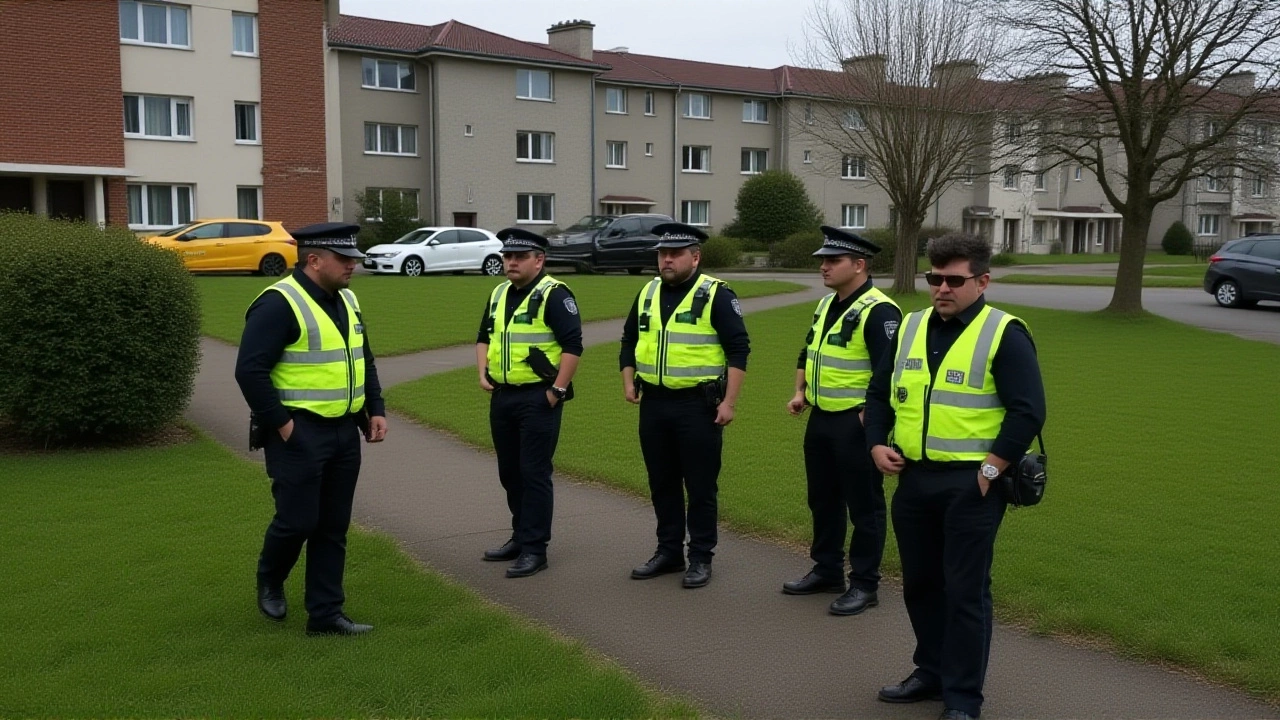At exactly 12:30 p.m. on November 12, 2025, a $15,000 cash handoff was about to happen in a quiet home in Essex, Massachusetts — until two police officers walked through the front door and stopped it cold. The suspect? Yi Peng Luo, a 35-year-old man from Revere, dressed like a delivery courier, clutching an envelope stuffed with bills he claimed was for "computer repair." But the computer wasn’t broken. And the tech support call? A total fabrication. What followed was a textbook example of how public awareness, quick thinking, and police response can derail a sophisticated scam before it ruins a family’s finances.
The Scam That Almost Worked
It started like so many others: an unsolicited pop-up on a computer screen, then a phone call from someone claiming to be from "Microsoft Support." The victim, an elderly resident of Essex, was told their system was infected with malware that could steal bank details. The solution? Pay $15,000 in cash — immediately — to "lock down" the threat. No invoice. No receipt. No verification. Just fear, urgency, and a promise that failure to pay would mean total data loss. The victim, overwhelmed and confused, began gathering the money. That’s when a family member stepped in. Instead of brushing it off as another scam call, they called the Essex Police Department at 978-768-6628. Within minutes, Sergeant Daniel Bruce and Officer David Vangelist arrived. They intercepted Yi Peng Luo just as he was about to hand over the envelope. "He looked nervous," Officer Vangelist later told investigators. "Didn’t know what to do with his hands. Kept glancing at his watch like he was on a timer. No badge. No company ID. Just a black bag and a story that didn’t add up."Behind the Curtain: A Network, Not Just One Man
The arrest wasn’t the end — it was the beginning. Essex Police Department Chief Thomas Shamshak and Detective Sergeant Robert Wheway led a full on-site investigation. They found no evidence Luo worked for any legitimate tech firm. His phone was wiped. His vehicle contained no company materials. Only a single burner phone and a handwritten note with three other addresses in Massachusetts — all in towns where similar scams had been reported in the past six months. "This isn’t a lone actor," said Detective Wheway during a press briefing. "We’ve seen this pattern before. Someone calls. Someone else shows up with cash. Someone else handles the money later. We’re tracing the chain backward." The amount demanded — $15,000 — was unusually high. Most tech support scams target $500 to $2,000. This was a targeted, high-stakes operation. According to the Federal Trade Commission (FTC), such scams cost U.S. consumers over $150 million in 2024 alone. But this one? It was personal. The victim lived alone. Wasn’t tech-savvy. Trusted the system. And nearly lost their life savings.Legal Consequences and What Comes Next
Yi Peng Luo was charged with Attempt to Commit a Crime (Larceny Over $1,200) under Massachusetts General Laws. He’s scheduled to be arraigned on November 13, 2025, at Gloucester District Court. Bail has been set at $10,000. But the real story isn’t just about one man in handcuffs. The Essex Police Department is now coordinating with the Massachusetts State Police and the Essex County District Attorney’s Office to identify the orchestrators behind the operation. Authorities believe Luo was a "runner" — someone hired to collect cash, not design the scam. The real criminals? Likely operating from outside the state, possibly overseas, using VoIP numbers and fake websites to mimic corporate support portals. "We’ve got IP logs, call records, and witness statements," said Chief Shamshak. "This is going to take months. But we’re not stopping until we break the whole network."
What You Need to Know — And Do
The Federal Trade Commission (FTC) warns that tech support scams are among the most aggressive frauds targeting seniors and non-tech users. Here’s what to remember:- Legitimate tech companies never call you unsolicited. If you didn’t ask for help, they’re not calling.
- They don’t demand cash. Ever. Not even for "urgent" issues.
- Pop-ups claiming your computer is infected? Close them. Don’t call the number.
- Verify any service provider through official websites — not links sent via email or text.
- If you’re unsure? Call the Essex Police Department at 978-768-6628. They’ll help you verify — no judgment.
Why This Matters Beyond Essex
This case isn’t isolated. In 2024, the FTC received over 140,000 reports of tech support scams nationwide. Many victims never report them — out of shame, confusion, or fear of being blamed. But when someone like the Essex resident’s family member picks up the phone and calls police? Lives change. Money stays in pockets. And criminals get one step closer to being caught. The Essex Police Department is now rolling out a new community outreach program called "Tech Shield," partnering with local libraries and senior centers to host free scam awareness workshops. The first session is scheduled for December 5, 2025, at the Essex Public Library. "We can’t be everywhere," said Sergeant Bruce. "But if you know what to look for — and you’re brave enough to speak up — you become part of the solution."Frequently Asked Questions
How common are tech support scams like the one in Essex?
Tech support scams are among the most frequent frauds targeting older adults in the U.S., with over 140,000 reports filed with the FTC in 2024 alone. These scams often use fake pop-ups or robocalls pretending to be from Microsoft, Apple, or Dell. The average loss per victim is $1,200, but cases like the one in Essex — where $15,000 was demanded — are rare and indicate organized criminal networks.
Why was the suspect arrested for "attempt" and not completed larceny?
Under Massachusetts law, attempting to commit a crime — even if the victim doesn’t hand over money — is still a felony. Since the suspect was caught in the act of delivering cash with intent to defraud, prosecutors can charge him with attempt. This is critical because it allows law enforcement to intervene before the crime is completed, which is exactly what happened in Essex.
What should I do if I get a call saying my computer is infected?
Hang up immediately. Don’t click any links, don’t download anything, and don’t give remote access to your computer. Then call your local police department or the FTC at 1-877-FTC-HELP. You can also visit ftc.gov/scams for verified guidance. Legitimate companies will never ask you to pay in gift cards, cryptocurrency, or cash — especially not over the phone.
Is there a chance more people were targeted by this same group?
Absolutely. Detective Sergeant Robert Wheway confirmed investigators are reviewing 12 similar reports from Essex, Middlesex, and Suffolk counties since July 2025. The scammer’s use of burner phones and cash pickups suggests a repeat operation. Authorities are urging anyone who received unsolicited tech calls in the past six months to come forward — even if they didn’t pay anything.
Can I trust tech support services advertised online?
Be extremely cautious. Many fake services appear at the top of Google searches using paid ads and SEO tricks. Always verify a company’s legitimacy through the official website of the tech brand (like microsoft.com/support) — not through links in emails or pop-ups. If a service asks for payment upfront or remote access without a clear contract, walk away.
What’s being done to prevent future scams in Essex County?
The Essex Police Department is launching "Tech Shield," a free community education program starting December 5, 2025, at the Essex Public Library. Workshops will teach seniors how to spot scams, use built-in security tools, and report suspicious calls. They’re also partnering with local banks to flag unusual cash withdrawals by elderly customers — a known red flag in scam cases.






Written by Griffin Callahan
Hi, I'm Griffin Callahan, a sports enthusiast with a particular expertise in tennis. I've dedicated years to studying the game, both as a player and an analyst. My passion for tennis has led me to write extensively about the sport, covering everything from player profiles to match analyses. I love sharing my knowledge and insights with fellow tennis fans, and I'm always eager to engage in discussions about the sport we all love.
All posts: Griffin Callahan